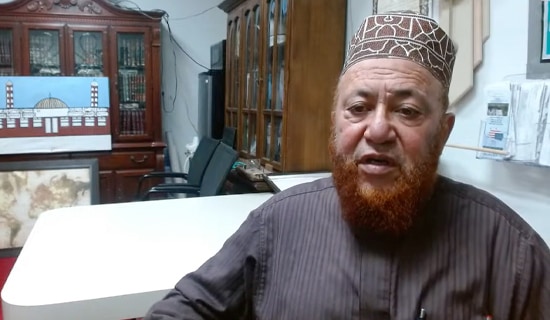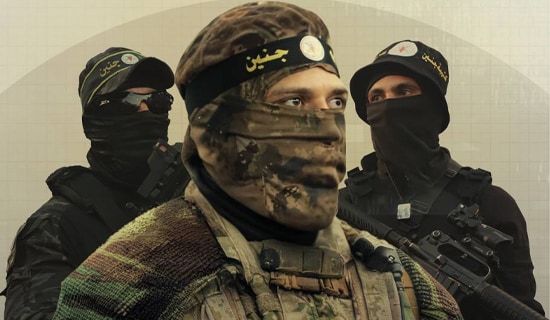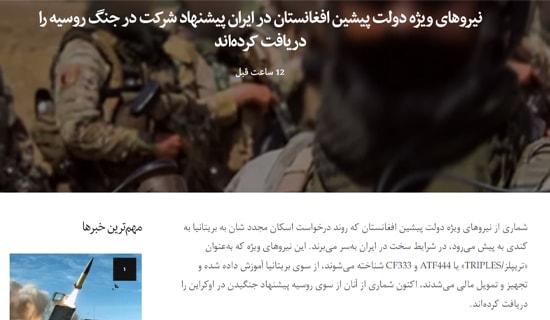By: MEMRI Staff
Several days ago, a severe crisis erupted between Qatar and other Gulf states, headed by Saudi Arabia, following the publication of a report of uncertain authenticity on the website of the official Qatari news agency QNA. The report, which appeared on the website on May 23, 2017, presented statements allegedly made by the Qatari Emir, Sheikh Tamim bin Hamad Aal Thani, at a commencement ceremony for National Guard recruits in Qatar. According to the report, the Emir harshly criticized the UAE, Egypt, Bahrain, and also implicitly Saudi Arabia, accusing them of waging a smear campaign against Qatar with the aim of depicting it as a supporter of terrorism, and adding that the real danger is posed by countries that have adopted an extremist version of Islam. Also according to the report, the Emir defended his country's support for the Muslim Brotherhood (MB), Hamas, Hizbullah, and Iran, and criticized the anti-Iran policy of the Gulf states, saying that "it is impossible to disregard the regional and Islamic prominence of Iran, and unwise to escalate [the conflict] with it." His alleged statements were also quoted in a Qatari television report about the commencement ceremony.
About half an hour after it appeared on the QNA website, the report containing the Emir's statements was removed from both the site and from the agency's social media pages. The Qatari Foreign Ministry issued a statement saying that the report was fabricated and had been planted on the site by hackers.
The Emir's reported statements sparked fury in many Gulf states, especially in Saudi Arabia, both before and after the denial; this rage was manifested in an unprecedented media attack on Qatar in the press, on television and on social media. It was claimed that Qatar does indeed support terror organizations and Iran, and that its policy undermines Gulf unity and will lead to Qatar's isolation in the region.[1]
Qatar's claim that the QNA website had been hacked and that the report of the Emir's statement was fabricated failed to quell the outrage in the Gulf press. The Saudi daily 'Okaz, for example, quoted one technical expert as saying that it would have been difficult to hack the QNA accounts on all the social networks simultaneously without the account administrators' awareness.[2] An editorial in a Kuwaiti daily called on Qatar to issue a denial from higher echelons of its government in order to reassure the people of the Gulf.[3]
It should be noted that this is not the first time there has been severe tension between Qatar and the GCC states over Qatar's foreign policy. In March 2014, following over six months of disagreement between Qatar and other Gulf states, Saudi Arabia, the UAE and Bahrain recalled their ambassadors from Qatar on the grounds that Qatar was not meeting its commitments to them (see MEMRI Inquiry & Analysis No. 1075, Unprecedented Tension Between Qatar And Saudi Arabia/UAE/Bahrain Threatens To Break Up Gulf Cooperation Council, March 14, 2014). Relations were reestablished a year later, apparently after Qatar committed to conform to GCC policy.
The following is a review of the current conflict between Qatar and the Gulf states, as reflected in the Gulf media.
Statements Attributed To Qatari Emir: The Smear Campaign Linking Qatar To Terrorism Is Perverted; The Real Danger Comes From Other Countries Whose Governments Have Adopted An Extremist Version Of Islam; Iran Is A Power That Can Guarantee Regional Stability
As stated, on May 23, 2017, a report on the website of the Qatari news agency QNA quoted Qatari Emir Sheikh Tamim bin Hamad Aal Thani as saying, at a National Guard commencement ceremony: "We condemn [the fact that] we are accused of supporting terrorism despite our ongoing efforts [to combat terror] along with our brethren and [despite] our participation in the international coalition against ISIS." He reportedly said further: "The real danger [lies in] the course taken by certain governments that created terrorism by adopting an extremist form of Islam that does not represent [Islam's] true moderate character. [These countries] did not manage to combat [terror, and did nothing but] designate any justified action as criminal... Nobody has the right to accuse us of terror [just] because he has labeled the Muslim Brotherhood a terror organization or opposes the resistance role of Hamas and Hizbullah."
The Emir allegedly "demanded that Egypt, the UAE, and Bahrain assess their anti-Qatar position and stop the ongoing campaigns and accusations that do no good for the relations among the countries or their shared interests... Qatar does not interfere in the affairs of any country, no matter how much [that country] denies its people their freedom and their rights... We know the reasons and motivations behind the unjust campaign that is being waged against Qatar as the U.S. president visits the region – [a campaign] which is aimed at linking [Qatar] to terror and undermining its efforts to create stability... [and] we will pursue the countries and organizations responsible for this so as to defend Qatar's pioneering role on the regional and international level and to defend its honor and the honor of its people."
Also according to the report, the Emir added: "While the Al-'Udeid [Air Base near Doha, used by the U.S. military] is a Qatari stronghold that defends [this country] against the greed of some of its neighbors, it is also America's only chance to have military influence in the region..." He allegedly said further that "Qatar is interested in establishing a just peace between Hamas, the legitimate representative of the Palestinian people, and Israel through ongoing contacts between the two sides," while noting that "Qatar has no enemies, thanks to its flexible policy," and that the country "has managed to build close ties with both the U.S. and Iran simultaneously."
Another statement attributed to the Emir was: "It is impossible to disregard the regional and Islamic prominence of Iran, and unwise to escalate [the conflict] with it, especially in light of its [status] as a power that guarantees the stability of the region as long as [people] cooperate with it, and this is what Qatar seeks to do, for the sake of the stability of the neighboring countries." Regarding the U.S., he allegedly, "Relations between Qatar and the Trump administration are strained."[4]
As noted, about 30 minutes after it was posted, the report was removed from the QNA website and from the agency's social media pages. A Qatari Foreign Ministry official announced that the QNA website had been hacked and that "false and baseless reports" of statements by the Emir had been planted on it. The official also expressed surprise that despite reports that the website had been hacked, some media outlets continued to publish the statements instead of verifying their authenticity, "which raises serious questions regarding [these outlets'] goals."[5]
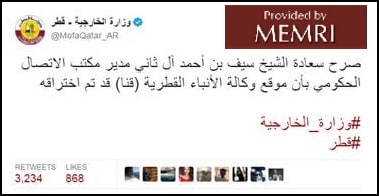
The Qatari Foreign Ministry statement (twitter.com/MofaQatar_AR, May 23, 2017)
Media Furor In Saudi Arabia Following Qatari Emir's Alleged Statements
Al-Arabiya: Qatar Has Ties With Terror Organizations, Chiefly Al-Qaeda, Jabhat Al-Nusra
The statements attributed to the Qatari emir evoked rage in Saudi Arabia, as manifested in harsh Saudi criticism of Qatar. Especially conspicuous were reactions on the Al-Arabiya channel, which belongs to the Saudi MBC network and is based in Dubai, UAE, and which aired various reports accusing Qatar of maintaining ties to terrorist organizations, especially Al-Qaeda and ISIS. At the same time, the channel emphasized that the accusations that Qatar supports terrorism originated not in the Gulf but in Western media.
A report aired on the Al-Arabiya channel and posted on its website stated: "It seems that the plot of Qatar – [a country that] is repeatedly attacking other countries, especially some of its neighbors – is coming back to bite it. As expressed by its Emir, Sheikh Tamim bin Hamad Aal Thani, it is now tasting the bitterness of what it calls 'unjustified attacks' aimed at linking it to terrorism... For many years Qatar took advantage of its capabilities in order to serve as the mouthpiece of the extremist organizations, among them Al-Qaeda, whose messages, including coded ones, Qatar would broadcast to the world.
"In addition, [Qatar] had a hand in shuffling the cards in the region following the [Arab Spring] revolutions six years ago. It took the side of the extremist organizations and of the organizations with ties to armed Islamic movements, and it helped the Muslim Brotherhood attain power in Tunisia, Libya, and Egypt. However, the accusations... about Qatar's links to terrorism were not made by its sister [Arab countries], but rather by those whom Qatar regards as its allies: Britain and the U.S. These attacks did not come from the Gulf and Arab media, despite Qatar's overt and covert incitement... In Egypt, Qatar supported the discourse of armed organizations and cultivated many people who [were later] wanted [by the authorities] and were prosecuted on terror-related charges."[6]
Another report on the Al-Arabiya channel and website, titled "Proven Ties Between Doha and Extremist Organizations," stated: "Innumerable accusations have been made against Qatar regarding its support of extremist organizations, including the Taliban and extremists in Libya and Syria. Jabhat Al-Nusra even declared that a Qatari charity campaign was the best way to finance its fighters in Syria. The ties between Doha and extremist organizations gave rise to questions regarding Qatar's role in the fight against terrorism – a role it purports to play despite its close ties with Al-Qaeda and its ilk."
The report also cited Western media news articles from the past few years about Qatar's links to terrorist elements; one stated that Qatar employs an individual who the U.S. Treasury says is one of the major coordinators of Al-Qaeda's funding operations, that Qatar is arming extremist organizations in Libya, and that it is serving as a base for Taliban diplomatic activity.[7]
Al-Jazirah Daily: The Qatari Emir Was Displeased With The Success Of The Arab Islamic American Summit; Qatar's Denial Is Unconvincing
The Saudi press joined in the attack on Qatar, as expressed in front-page headlines as well as articles and reports condemning the country and its Emir and accusing him of dividing the Arab ummah and of pursuing his own personal interests. On May 24, 2017, the Al-Jazirah daily came out with the headline "Qatari Emir Stabs His Neighbors with Iranian Dagger!!"

The May 24, 2017 front-page headline and article on Al-Jazirah website
An Al-Jazirah report stated: "It appears that the outstanding outcomes of the historic summit meetings hosted in Riyadh pained certain [elements]... and the results [of these meetings], including [the decisions] to isolate Iran, besiege extremism and terror, and deepen the relations and strategic partnership with the U.S., have caused some of them to fall out of the line of the Gulf and Arab [states]. Qatar has again committed an absurd political act whose implications it fails to understand... Its Emir declared that it would be unwise to show hostility towards Iran, since Iran is an Islamic country! [In doing so] he ignored the policy of the hostile [Iranian] regime, which has acted to export the Khomeini revolution and to exacerbate sectarian conflict in the countries of the region, and he has [also ignored] Iran's sponsorship and funding of terror. He is also ignoring its blatant interference in the affairs of the Gulf Cooperation Council [GCC] countries and [other] countries of the region! He thinks Iran is a power that can [guarantee] regional stability if we cooperate with it, and Qatar seeks such [cooperation] for the sake of the neighboring countries! The Qatari Emir is thereby stabbing [Qatar's] neighbors in the back with an Iranian dagger!..."[8]
Khalid Al-Malik, Al-Jazirah's editor-in-chief, wrote: "Qatar has become accustomed to treating the problems of the region's countries as if it [i.e. Qatar] had political weight and influence, or made decisions, and whose positions were taken into account... With his contradictory declarations of yesterday, the young Emir [of Qatar] greatly astonished, because [these statements] do not serve regional stability but heighten Qatar's isolation and the tension in the region. Likewise, they expose, one way or another, the ugly face of Qatari policy. The declarations by the Qatari Emir [Sheikh] Tamim exposed the hidden aspects of Qatari policy that Doha has previously attempted to hide. But yesterday, it revealed what was hidden, by means of the Emir's statements, that can only be regarded as words serving Israel and Iran...
"It appears that Qatar's emir was dissatisfied with the success of the Riyadh summits, and that the U.S. president's words about the [Saudi] kingdom enraged him. Perhaps he had expected Qatar to have a greater role during the Riyadh summits... Qatar's Emir deserves thanks and appreciation for his serious statements, because hiding behind honeyed words and idealistic speeches is worse than coming out in public and declaring [one's] true positions, as he did last night...
"Clearly, this policy is neither unexpected nor surprising… Qatar alone, or Qatar together with the Al Jazeera channel – which is exploited first and foremost to harm its neighbors and, subsequently, the Arab countries – plays a role that is bigger than it. This policy and this position are valueless in light of the steadfast positions and the prudent policy by which Saudi Arabia is leading its Arab and Muslim brethren, who have many challenges to deal with.
"Doha grasped the gravity of the statements by its emir, and [also saw] how they were welcomed by Hamas, Hizbullah, the Muslim Brotherhood, and Iran, and how they were condemned by sensible people from various countries in the world, first and foremost Saudi Arabia. [All this ] has induced [Qatar] to claim that [the website] of the Qatari news agency had been hacked, and that the statements attributed to the Emir Tamim were false. [But this denial] will not fool anyone who knows about Qatar's inner workings and politics, [and know also about] its security and diplomatic ties with Israel and Iran. I hope that this unacceptable Qatari position is the last expression of Qatar's breaking ranks with the Gulf [states] and the Arab [countries], and that it will realize that its power and territorial integrity are obtained only within the framework of harmony and cooperation with the Gulf countries and Arab states. It is inconceivable that it should insist on remaining apart from the Arab consensus, including its positions and policy..."[9]
Al-Riyadh Editorial: Unjustified, Illogical Statements That Serve No One; Iran Is An Evil Force
Al-Riyadh also harshly attacked Qatar; in an editorial, it stated: "The Riyadh summits and [the declaration] of their positive announcements and decisions had not even concluded before we were surprised by Qatari Emir's statements, which deviated from the Arab and Islamic agreements and consensus and constituted an unwarranted attack on all fronts.
"These unjustified and illogical statements serve no one, and not even Qatar itself with its unstable trends and policy. These statements harm the unity of the Arab ranks, which all the Arab countries, led by Saudi Arabia, are working mightily to heal, and to reduce the cracks in it... How can we consider Iran an Islamic power when it sows destruction and devastation in the Arab countries[?]... We unreservedly view Iran as an evil force. This is a reality recognized by the entire world. "[10]
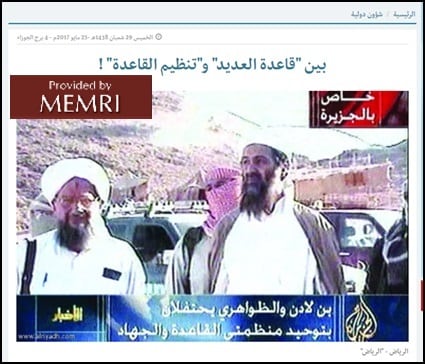
Anti-Qatar article in Al-Riyadh: "Between The Al-'Udeid [Air] Base and Al-Qaeda" (Al-Riyadh, Saudi Arabia, May 25, 2017)
Article In Saudi Daily 'Okaz: The Masks Have Fallen Off The Faces of The Defeated And The Hypocrites
Also, the Saudi daily 'Okaz severely criticized the Qatari Emir, in several articles – one of which was titled "Qatar Sows Dissent, Sides With The Enemies Of The Ummah."[11]

'Okaz headline, May 24, 2017: "Qatar Sows Dissent, Sides With The Enemies Of The Ummah."
Journalist Khalid Al-Jarallah wrote in 'Okaz: "The mask has fallen... and there is no longer any doubt that this defeated ghost [i.e. the Qatari Emir], whom the Arab consensus harmed, and whom Saudi Arabia's political weight and international status also harmed, found no way to conceal his anger and his hatred except by his pathetic experiments that he disseminates by means of an opportunistic for-profit media outlet... Saudi Arabia"s lofty status, which is by virtue of its sponsorship of Islam and peace, and of its handling the big problems in order to unite the ranks and heal the rift [in the Arab world] and to protect the international Islamic relations... obviously displeases the hostile [elements] who are looking after their own personal interests and who are profiting from various crises and conflicts.
"They are not even deterred from protecting a particular terror organization, or from cheering on another, as long as this is in line with their personal interests – no matter what the contradiction between [their own personal interests] and the interests of their countries and the affairs of their ummah..."[12]
Criticism In Gulf Press: Qatar Is Striking A Pact With The Enemy
The UAE press also criticized the Emir's statements. The daily Al-Bayan published a report titled "Qatar Stabs the Arab Consensus, Courts Iran."[13]
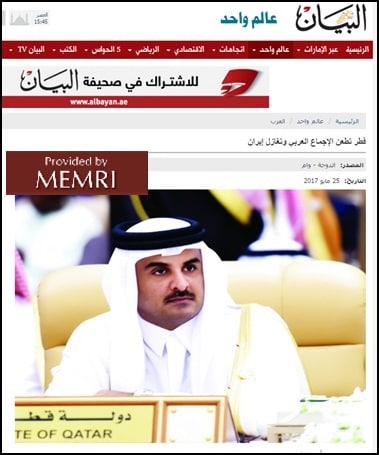
The Al-Bayan report
An Al-Bayan editorial, titled "Pact with the Enemy," stated: "When the Emir of Qatar defends Iran in his statements and considers it an Islamic power, [and says that] it is unwise to escalate the conflict with it, he expresses positions that are opposed to those of the Arabs, the Muslims and the world's enlightened forces. This is a position that ignores all of Iran's crimes against the Arab and Muslim world and against the Gulf countries, as well as the threat it poses to the security of the region. If Iran's policy destroys [this security], Qatar will be one of the main casualties.
"This position is also opposed to the Muslim consensus... and it [comes at] a sensitive time. The only conclusion we can draw from it is that Qatar has broken away from the position of the Gulf, the Arabs and the Muslims, in favor of a country that has harmed the security of the region and its peoples. The statements of the Qatari Emir, which seek to directly legitimize terrorism and terrorist organizations, cannot have been made out of an awareness of what is happening, especially of the fact that these organizations have an indirect role in Iran's undermining of the region's security [which is done] in preparation for dividing it and sparking religious, ethnic and sectarian wars... These statements harm the one who made them [the Qatari Emir], and present Qatar as a peninsula isolated from the rest of the Arab and Muslim [world]."[14]
Editor of Kuwaiti Daily: The Denial Is Insufficient; A Statement Must Be Issued By The Top Qatari Echelons
Ahmad Al-Jarallah, editor of the Kuwaiti daily Al-Siyassa, called on the Qatari leadership to issue an official denial of the Emir's statements and to dispel the fears of the Gulf peoples regarding Qatar's alleged support for Hamas and the Muslim Brotherhood. He wrote: "If we believe that Iran, or any other element that does not have Qatar's interests at heart, is behind [the alleged hacking]... this is an opportunity [for Qatar] to dispel the uncertainty felt by people in the Gulf regarding some of Qatar's positions. This must involve swift action by the top Qatari echelons, not merely a denial by some [anonymous] source. The statements published [expressed] hostile positions. No official in the Gulf can avoid seeing [them as] Iranian intervention in the internal affairs of the GCC countries... Moreover, while the GCC states and the entire world designate Hamas as a terror organization... Doha served as a safe haven for the officials of this movement, in disregard of the Gulf [countries'] position on this. Qatar also supports the Muslim Brotherhood, despite the deliberate damage this movement has caused in the Gulf countries... Despite all this, the GCC states maintained brotherly relations with Doha.
"I can't imagine that there is any Gulf leader, or even official, who would defend the Lebanese Hizbullah, as was allegedly done by the Qatari Emir, who knows all the crimes committed by this organization... The statements attributed to the young Emir anger all the people of the Gulf, [and] the official denial has not assuaged these feelings... There is need for a denial by the top echelons of the [Qatari] government, so that what was published [will not be taken to] actually reflect the real position of the dear Qatari leadership, but [instead] will be an opportunity to strengthen [Qatar], its media outlets and the entire Gulf front – for none of us wish to see Qatar as the sheath of the Houthi dagger in the Gulf..."[15]
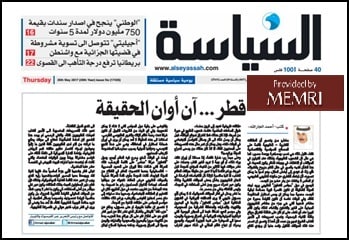
Jarallah's article, titled "The Moment of Truth Has Arrived," on the daily's front page
The Qatari Response: Qatar Is Victim Of Betrayal
Qatar, for its part, firmly denied that the Emir had made the statements, claiming that hackers had planted the report on the website of the QNA news agency as part of a well-planned plot. Qatari state papers alleged a conspiracy against Qatar, without specifying who might be behind it. They directed harsh criticism against the media outlets that had participated in it, especially "media in sister countries."
Muhammad Hamad Al-Marri, editor of the Qatari Al-Watan daily, described the affair as a failed conspiracy, writing: "The execution [of this plot] was lame and embarrassing, and the plan collapsed faster than the failed coup in Turkey... It was a planned operation aimed at [igniting] flames of fratricidal war..."
Al-Marri explained that this was an attempt to undermine Qatar's close relations with other Gulf states, especially Saudi Arabia, and added: "These close relations upset some [people], and in the last few weeks they tried to damage Qatar's image by tying it to terror. At the Gulf-Islamic-American Riyadh Summit [i.e. the Arab Islamic American Summit], U.S. President Donald Trump declared Qatar a strategic partner in the war on terror, and this angered those who had acted to harm Qatar and attempted to distort its positions. Shortly after [this summit], they resorted to hacking as a last option...
"We support the Arab kingdom of Saudi Arabia, our big sister, which is the first line of defense for the entire region. The question is: What was the aim of this entire affair? Was it aimed only at Qatar, or was it [intended to harm] the security of the Gulf as a whole? It seems that the aim... was to undermine our Gulf unity and tear it to shreds by dragging it into a labyrinth of fabricated conflicts aimed at [undermining] the security of all of us, without exception."[16]

Cartoon in Qatari daily: "Qatar and Saudi Arabia: One people, sharing the same blood and same destiny (Al-Raya, Qatar, May 25, 2017)
Muhammad Al-Ansari, a senior columnist for the Al-Raya daily, took a harsher tone, writing: "A treacherous stab in the back is always deadly, especially when it comes from those closest to us, from one of our brethren. The blow [we received] the day before yesterday [on May 23] was delivered by several official and semi-official channels and media outlets in sister countries, which broadcast the [Emir's] fabricated statements within 15 minutes of their appearance [on the website] under the headline 'breaking news,' as though this was an important journalistic scoop that had to reach every citizen in the Gulf and the Arab countries and even every foreigner. Reporters, analysts and consultants were brought in to discuss the false claims about Qatar's positions that dismantle the Arab unity and [its alleged] mistaken political steps – and all this, because Qatar has not submitted to anyone's will and will not submit to anyone's directives..."[17]
Qatari journalists on social media were even more direct in their criticism of Saudi Arabia. Prominent journalist Jaber Al-Harmi accused the Saudi media of "prostituting itself," tweeting: "Prostitution is not just physical lewdness. There is also media prostitution..."[18] He also tweeted: "I think what happened was good for Qatar. It tore away the fig leaf [covering] the shame of many: channels, websites, editors and mercenaries."[19]
'Abd Al-Rahman bin Hamad Aal Thani, Executive Officer of the Qatar Media Corporation, tweeted: "Some media outlets have clearly adopted the philosophy of Nazi propaganda minister Goebbels, who said, 'lie until they believe you.'"[20]
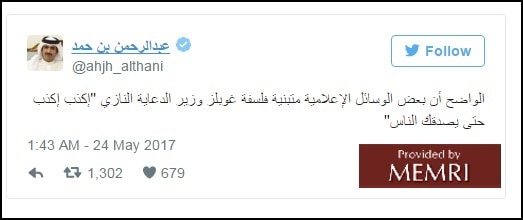
[1] It should be noted that in the week leading up to U.S. President Donald Trump's Riyadh visit, a number of articles and investigative reports in the Western media accused Qatar of providing political and financial support to terrorist organizations such as Hamas, Jabhat Al-Nusra and the Taliban, and questioned U.S. cooperation with the Qatar in light of this. On May 20, 2017, the Qatari Foreign Ministry issued a statement condemning these anti-Qatar reports. The statement denied the claims made in the reports and added that Qatar is exposed to the terror threat just like all the other Middle East countries, and that the reports were deliberately published ahead of Trump's visit to the region. Al-Sharq (Qatar), mofa.gov.qa, May 20, 2017.
[2] 'Okaz (Saudi Arabia), May 24, 2017.
[3] Al-Siyassa (Kuwait), May 25, 2017.
[4] Qna.org.qa, May 23, 2017.
[5] Mofa.gov.qa, May 24, 2017.
[6] Alarabiya.net, May 24, 2017.
[7] Alarabiya.net, May 24, 2017.
[8] Al-Jazirah (Saudi Arabia), May 24, 2017.
[9] Al-Jazirah (Saudi Arabia), May 24, 2017.
[10] Al-Riyadh (Saudi Arabia), May 24, 2017.
[11] Okaz (Saudi Arabia), May 24, 2017.
[12] 'Okaz (Saudi Arabia), May 24, 2017.
[13] Al-Bayan (UAE), May 25, 2017.
[14] Al-Bayan (UAE), May 25, 2017.
[15] Al-Siyassa (Kuwait) May 25, 2017.
[16] Al-Watan (Qatar), May 25, 2017.
[17] Al-Watan (Qatar), May 25, 2017.
[18] Twitter.com/jaberalharmi, May 24, 2017.
[19] Twitter.com/jaberalharmi, May 24, 2017.
[20] Twitter.com/ahjh_althani, May 24, 2017.


